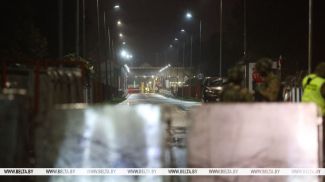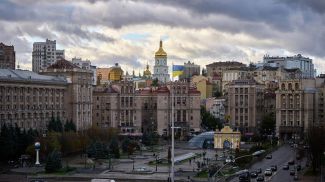MINSK, 25 February (BelTA) – The information war against Belarus has not ended yet. Deputy Prime Minister Igor Petrishenko made the statement at a session of the Belarusian Information Ministry board on 25 February, BelTA has learned.
The official said: “The information war – and it is exactly a war – that has been launched against our country is not over yet. The Information Ministry has managed to do its job as a whole. Our mass media have recovered from the situation decently and continue stoutly defending state interests and priorities. In the last six months the role of mass media increased so much that it is now difficult to estimate it properly. The processes going on in the university student community, the youth community, and even in labor collectives of enterprises depend heavily on how mass media work. And on how clearly we formulate the information agenda, how promptly we repulse attempts at destructive influence on our society. Preparations for the 6th Belarusian People's Congress demonstrated that the Information Ministry had arranged systemic work in the media sphere, had established cooperation with mass media of all levels. In turn, mass media demonstrated their ability to get reorganized fast, work actively, and deliver information in a vivid manner.”
The deputy prime minister pointed out that multiple significant events are held in Belarus every year. They are designed to not only consolidate the society but also to demonstrate to the entire world how the government cares for citizens, how Belarusian history is honored, how memory about the most important events in the nation's fate is preserved. “Last year mass media worked quite successfully and tried to perform their functions as effectively as possible. The current accomplishments are the result of work of reporters, their professionalism, personal involvement, and a solid civic stance. An analysis of the country's information field indicates that there are issues the Information Ministry has to address together with the leadership of mass media and municipal government agencies. Your smooth work and professionalism will determine how successfully we will be able to compete in media space,” he noted.
Igor Petrishenko stressed that despite the universal adoption of digital technologies printed mass media represent a considerable segment of the country's information field. “The global trend of falling circulation of printed media can be felt in Belarus, too. The printed mass media accomplished a lot over the course of the year: measures are being taken to change the outlook of newspapers, quality of their content, introduce multiple channels in information distribution. In order to keep their audience, regional mass media should meet the challenges of time, be able to promptly adapt to needs of their readers. The layout and content of many newspapers still need modifications and modernization. The content they offer to readers should be unique and should substantially differ from what can be found online,” he stated. “Moreover, due to fake news and information leaks the audience now thirsts for professional and objective journalism. All the regional mass media need to transform into multimedia resources, need to know how to create content for websites and social networks. The relevant specialists should work on it. To do that, it is necessary to continue the practice of regional educational seminars for reporters and to consider the possibility of advanced training for the personnel in the area of digital mass media.”
Igor Petrishenko is convinced that printed mass media should more actively work online. “National and regional newspapers and magazines should more actively work online in order to preserve printed copies. Not only by developing their own websites but by offering content to other Internet resources. Social networks, instant messengers, and mobile apps have become the primary source of information for many young citizens. We need to do better in this area,” he added.













